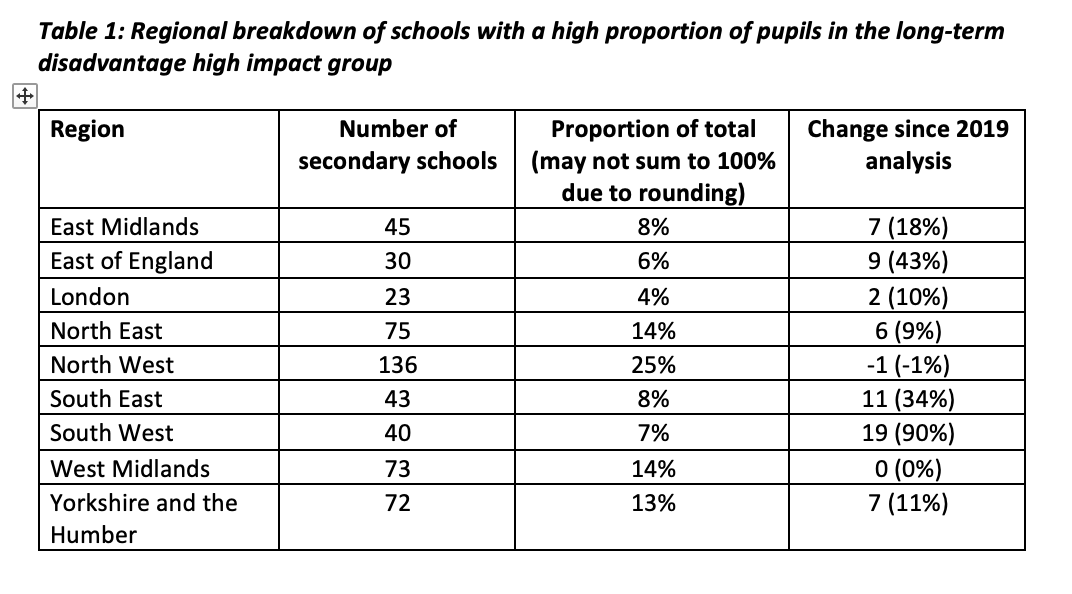There has been a sharp increase in the number of schools with high levels of “long-term disadvantage” pupils in the years before the Covid-19 pandemic, according to research published today.
The Northern Powerhouse Partnership (NPP) has revealed that last year there were 537 secondary schools in England with at least 10 per cent of pupils who had long-term disadvantage, having qualified for free school meals for at least 80 per cent of their time in school.
The new report also warns that the impact of this disadvantage on attainment appears to be increasing, with schools with higher numbers of these students seeing exam performance drop.
Exclusive: Covid has hit poorer schools twice as hard
Warning: Covid-19 ‘widens achievement gap to a gulf’
Analysis: North-South is divide all about pupils’ background
The number of schools in this category increased by 16 per cent between 2018 and 2019.
The NPP, which brings together political and business leaders in the North, also warned that these schools were concentrated in the North of England.
Schools in the North ‘more impacted by disadvantage’
One in 10 (10.1 per cent) of pupils in the North East were found to fall into the long-term disadvantage category.
This was double the national average. The North West was found to have the second-highest proportion of these children with 7.3 per cent, followed by Yorkshire and the Humber with 6 per cent.
By contrast, just 2.8 per cent of pupils in Outer London were found to be in the category.
 The report, published today, warns that the impact of long-term disadvantage on attainment appears to be increasing.
The report, published today, warns that the impact of long-term disadvantage on attainment appears to be increasing.
It shows that 71 per cent of schools with high numbers of the long-term disadvantaged had attainment significantly below the national average for pupil premium children - an increase from 67 per cent in 2018.
The NPP is calling for £34 million to fund a mentoring programme for disadvantaged GCSE pupils in the North.
It has said this would allow expansion of an existing mentoring scheme that links children with recent graduates from Sheffield Hallam University, who are trained to provide academic and wellbeing support and guidance.
Lord O’Neill, vice-chair of the NPP, said: “It goes without saying that this past year has deepened the divide in our educational system but this report shows that the situation was far from perfect even before the pandemic.
“We’ve gone past the point where this is simply a disadvantage gap; what we’re talking about is a disadvantage chasm.
“Driving up educational standards among all children and young people has always been and remains one of the cornerstones of the Northern Powerhouse vision.
“We now need bold, swift action from the government. Firstly, a northern mentoring programme for every disadvantaged pupil at GCSE level. Secondly, emergency funds to support pupil premium recipients and reform to target this at the most vulnerable.
“Lastly, we need measures to address place-based issues that take place beyond the school gate.”
Russell Hobby, chief executive of education charity Teach First, said: “We know that this pandemic has dealt a bitter blow to our young people, exacerbating existing inequalities. So it’s deeply concerning to see so starkly that even before the pandemic, persistent gaps between poorer and richer pupils were already widening.
“The immediate priority needs to be ensuring every child has the technology needed to study from home. But we also must turn our attention to a long-term recovery plan for pupils, especially in schools serving poorer communities.
“If we don’t get this right and invest in supporting pupils to recover, we run the risk of wasting the skills of an entire generation of ambitious young people - despite desperately needing their new ideas and resilience to help the country bounce back.”


 The report, published today, warns that the impact of long-term disadvantage on attainment appears to be increasing.
The report, published today, warns that the impact of long-term disadvantage on attainment appears to be increasing.